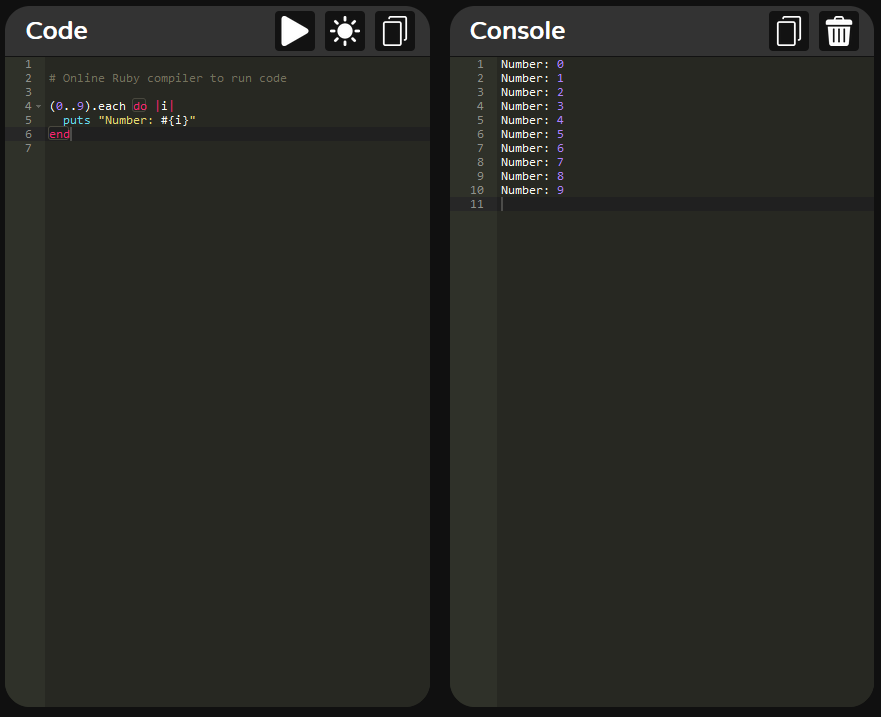How To Compile Ruby Code In Your Browser
What is Ruby?
Ruby is a dynamic, object-oriented programming language renowned for its simplicity and productivity. Created by Yukihiro Matsumoto, or Matz, in the mid-1990s, Ruby was designed to prioritize programmer happiness and efficiency. Its syntax draws inspiration from several languages, including Perl, Smalltalk, and Lisp, resulting in a clean and readable codebase. One of Ruby's defining features is its object-oriented nature, where everything, including primitive data types, is treated as an object. This fosters a consistent and intuitive programming experience, allowing developers to focus on problem-solving rather than cumbersome syntax.
At its core, Ruby embodies the principle of convention over configuration, which means it comes with sensible defaults and conventions that reduce the need for explicit configuration. This philosophy is exemplified by frameworks like Ruby on Rails, a popular web application framework built on top of Ruby. Rails embraces the "Don't Repeat Yourself" (DRY) principle, enabling developers to write less code by emphasizing convention over customization. As a result, Ruby on Rails has gained widespread adoption in web development for its rapid prototyping capabilities and elegant solutions to common web development challenges.
Despite its simplicity, Ruby boasts powerful metaprogramming capabilities, allowing developers to write code that writes code. Metaprogramming enables dynamic alterations to a program's structure during runtime, facilitating tasks such as method creation, modification, and composition. This feature empowers developers to build highly flexible and reusable components, enhancing the maintainability and scalability of Ruby applications. However, it also requires careful consideration and discipline to avoid introducing unnecessary complexity or compromising code readability.
Moreover, Ruby's vibrant community and extensive ecosystem contribute to its enduring popularity. The RubyGems package manager provides access to thousands of libraries and tools, covering a wide range of domains, from web development to data analysis and beyond. Additionally, online resources like documentation, tutorials, and forums abound, fostering knowledge sharing and collaboration among Ruby enthusiasts worldwide. Overall, Ruby's elegant syntax, object-oriented paradigm, metaprogramming capabilities, and thriving community make it a versatile and enjoyable language for both beginners and seasoned developers alike.

What is a Ruby compiler?
A Ruby compiler or interpreter is a crucial component of the Ruby programming language ecosystem, responsible for translating human-readable Ruby code into machine-executable instructions. While the terms "compiler" and "interpreter" are often used interchangeably, they represent distinct approaches to executing code. A compiler translates the entire source code into machine code or bytecode before execution, whereas an interpreter processes and executes code line by line. In the case of Ruby, it primarily employs an interpreter-based execution model, though some projects have explored compiling Ruby code into native machine code for performance optimization.
The Ruby interpreter reads Ruby source files, parses them into an abstract syntax tree (AST), and then executes the instructions defined by the code. During the parsing phase, the interpreter analyzes the structure of the code to identify syntax errors and ensure adherence to the Ruby language specifications. Once the parsing is complete, the interpreter traverses the AST, evaluating each node and executing the corresponding operations. This process involves dynamic type checking and method dispatch, as Ruby is a dynamically-typed language that resolves method calls and variable references at runtime.
Matz's Ruby Interpreter (MRI) is the reference implementation of the Ruby programming language and serves as the default interpreter for most Ruby applications. MRI is written in C and provides a robust runtime environment for executing Ruby code on various platforms, including Linux, macOS, and Windows. Additionally, alternative Ruby implementations, such as JRuby (running on the Java Virtual Machine) and Rubinius (implemented in C++ with a focus on concurrency), offer compatibility with different execution environments and performance optimizations.
In recent years, efforts to improve the performance of Ruby have led to the development of just-in-time (JIT) compilers, which dynamically compile Ruby code into native machine code during execution for significant performance gains. Projects like MJIT (a JIT compiler for MRI) and TruffleRuby (leveraging GraalVM's JIT capabilities) aim to enhance the execution speed of Ruby applications without sacrificing compatibility or developer convenience. Overall, the Ruby compiler/interpreter plays a pivotal role in making Ruby code executable on diverse platforms and continues to evolve to meet the demands of modern software development.

What are the upsides of running Ruby code in your browser?
An online Ruby compiler hosted within a web browser offers several distinct advantages, particularly for beginners, educators, and developers seeking quick prototyping and collaboration capabilities. Firstly, accessibility stands out as a primary benefit. With an online Ruby compiler, users can write and execute Ruby code directly within their web browsers without the need for installing or configuring local development environments. This accessibility lowers the barrier to entry for individuals new to programming or those exploring Ruby for the first time, enabling them to start coding immediately with minimal setup overhead.
Secondly, online Ruby compilers provide a platform-agnostic solution for code execution and sharing. Users can access the compiler from any device with a web browser, including desktop computers, laptops, tablets, and smartphones, regardless of the underlying operating system. This flexibility is particularly advantageous for educators delivering programming courses or workshops, as it ensures a consistent coding experience for students regardless of their hardware or software setup. Additionally, developers collaborating on projects can easily share code snippets and collaborate in real-time using online compilers, fostering knowledge exchange and teamwork.
Furthermore, online Ruby compilers often offer additional features and integrations to enhance the coding experience. For instance, syntax highlighting, code autocompletion, and error checking can help users write cleaner, more error-free code. Some platforms also provide built-in documentation and tutorials, enabling users to quickly reference language features and best practices while coding. Additionally, integration with version control systems like GitHub allows developers to save and manage their code directly from the online compiler, streamlining the development workflow and promoting code reuse and collaboration.
Lastly, online Ruby compilers offer a safe and sandboxed environment for executing code, mitigating security risks associated with running untrusted code on local machines. By isolating the execution environment from the user's system, online compilers help protect against malicious code injection and potential damage to sensitive data or system resources. This security feature is particularly valuable for educational institutions and online coding platforms, ensuring a safe and secure learning environment for students and users. Overall, the upsides of an online Ruby compiler in a web browser include accessibility, platform independence, enhanced features, and improved security, making it a valuable tool for learning, teaching, and collaborating on Ruby programming projects.

What are the downsides of running Ruby code in your browser?
While online Ruby compilers offer numerous benefits, they also present certain drawbacks that users should consider. One significant downside is the reliance on internet connectivity. Since online compilers execute code in a remote server environment, users must have a stable internet connection to access the compiler and submit code for execution. In situations where internet access is limited or unreliable, such as in rural areas or during travel, users may experience disruptions in their coding workflow or be unable to access the compiler altogether. Additionally, internet connectivity issues can lead to delays in code execution and feedback, impacting productivity and frustrating users who rely on real-time interactions with the compiler.

How can Ruby be compiled in a browser?
Ruby can be easily compiled in your browser with our free and online Ruby compiler, this compiler tool allows you to run Ruby on-the-go with a browser and an internet connection. This is suited for people who are learning Ruby, and want a portable and hassle-free way to learn Ruby
